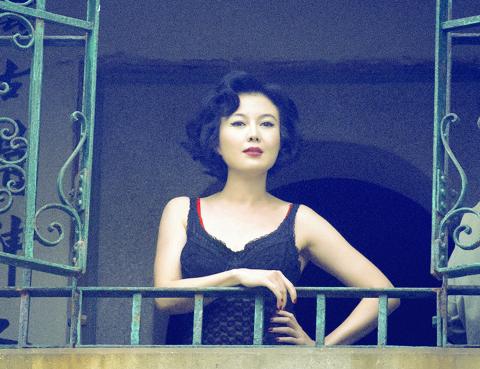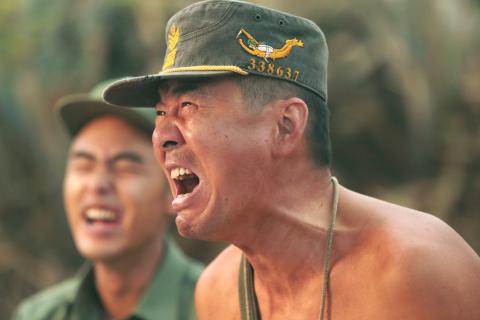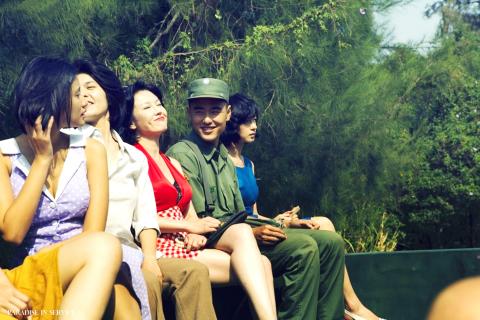With Paradise in Service (軍中樂園), his fourth feature film, director Niu Chen-zer (鈕承澤) revisits a time when the Chinese Nationalist Party (KMT) regime still clung to a pipe dream to reclaim China, as a way to pay tribute to his father’s generation. Although intended as a gripping tale of personal longing against a backdrop of sociopolitical unrest, the film never fully lives up to its ambitions and ends up telling a simple coming-of-age story in which history largely plays a subordinate role.
Set in 1969, Paradise begins with Pao (Ethan Ruan, 阮經天) arriving in Kinmen (金門) — then a cold-war frontline under intense artillery bombardment — to begin his military service. To this simple young man, life on the heavily fortified outpost only a few kilometers off the Chinese coast is at first formidable and baffling. Things worsen when he is assigned to an elite amphibious unit, where soldiers should expect to be treated “as dogs, not humans,” says Zhang (Chen Jianbin, 陳建斌), a sergeant major who leads the unit.
Despite their differences, Pao strikes up an unlikely friendship with Zhang, who as a teenager was forced from his rural home in northern China, by KMT troops that desperately needed soldiers to fight its doomed battles against the Communists in the Chinese Civil War. Zhang has been out of contact with his family ever since.

Photo Courtesy of Honto Production
Soon after, it becomes clear that Pao’s fear of water is an obstacle to his training on the elite amphibious unit, and he is transferred to Unit 831, a military brothel that provides services to the KMT troops on the island. This is where Pao meets and falls for Nini (Regina Wan, 萬茜), a young woman with a secret who works at the brothel.
It’s also where Zhang sets his mind on marrying Jiao (Ivy Chen, 陳意涵), another sex worker with a troubled past. Sadly, the sergeant major’s dream of settling down and having a family eventually meets a destructive end.
Two years later, Pao is discharged from military service, no longer the innocent boy he used to be, but a man who has had a glimpse into the folly and the despair of humanity.

Photo Courtesy of Honto Production
Technically polished and narratively smooth, the film is ambitious in its attempt to capture a turbulent chapter in history that still deeply resonates in present-day Taiwan.
Central to Niu’s history is the character of Zhang, played by Chinese thespian Chen Jianbin. Chen delicately invests his role with a grand pathos and sense of fragility. A father figure to the young protagonist, his character embodies the fate of Chinese soldiers uprooted by civil war and trapped faraway in nostalgia for their homes. His final outburst of fury and anguish serves as a poignant coda to a particular moment in history marked by rootlessness and violence.
Nonetheless, history often recedes to the background in the two-hour long film, while most of the narrative revolves around Ruan’s character and his journey from the loss of innocence to disillusionment to regaining hope. Love and romance remain in the confinement of a private room, rather than reflecting on and resonating with the time the protagonists live in. A light critique of the military machine and relentless oppression during the Martial Law era is also thrown in, feebly channeled through a few scenes of harsh military training and the portrait of a soldier, aptly played by Wang Po-chieh (王柏傑), being bullied by his seniors.

Photo Courtesy of Honto Production
Made with ambition and an epic grandeur in mind, Paradise in Service somehow forgets what it sets out to do in the beginning, leaving history behind somewhere along the way.

Photo Courtesy of Honto Production

Photo Courtesy of Honto Production

Taiwan has next to no political engagement in Myanmar, either with the ruling military junta nor the dozens of armed groups who’ve in the last five years taken over around two-thirds of the nation’s territory in a sprawling, patchwork civil war. But early last month, the leader of one relatively minor Burmese revolutionary faction, General Nerdah Bomya, who is also an alleged war criminal, made a low key visit to Taipei, where he met with a member of President William Lai’s (賴清德) staff, a retired Taiwanese military official and several academics. “I feel like Taiwan is a good example of

March 2 to March 8 Gunfire rang out along the shore of the frontline island of Lieyu (烈嶼) on a foggy afternoon on March 7, 1987. By the time it was over, about 20 unarmed Vietnamese refugees — men, women, elderly and children — were dead. They were hastily buried, followed by decades of silence. Months later, opposition politicians and journalists tried to uncover what had happened, but conflicting accounts only deepened the confusion. One version suggested that government troops had mistakenly killed their own operatives attempting to return home from Vietnam. The military maintained that the

Jacques Poissant’s suffering stopped the day he asked his daughter if it would be “cowardly to ask to be helped to die.” The retired Canadian insurance adviser was 93, and “was wasting away” after a long battle with prostate cancer. “He no longer had any zest for life,” Josee Poissant said. Last year her mother made the same choice at 96 when she realized she would not be getting out of hospital. She died surrounded by her children and their partners listening to the music she loved. “She was at peace. She sang until she went to sleep.” Josee Poissant remembers it as a beautiful

Before the last section of the round-the-island railway was electrified, one old blue train still chugged back and forth between Pingtung County’s Fangliao (枋寮) and Taitung (台東) stations once a day. It was so slow, was so hot (it had no air conditioning) and covered such a short distance, that the low fare still failed to attract many riders. This relic of the past was finally retired when the South Link Line was fully electrified on Dec. 23, 2020. A wave of nostalgia surrounded the termination of the Ordinary Train service, as these train carriages had been in use for decades